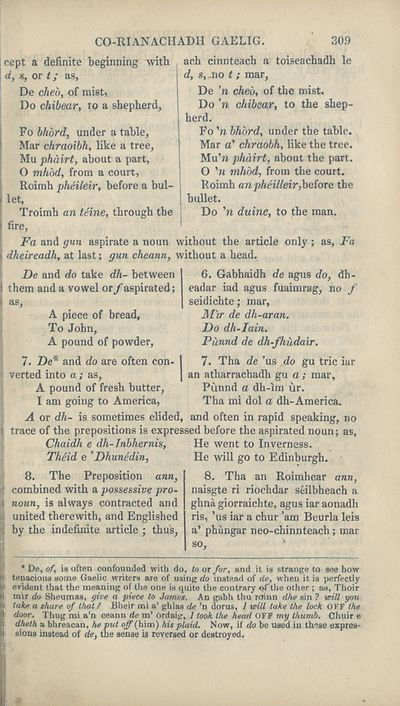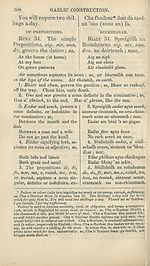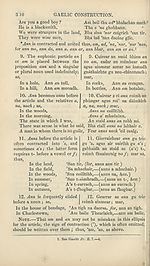Books and other items printed in Gaelic from 1841 to 1870 > Double grammar, of English and Gaelic, in which the principles of both languages are clearly explained
(309) Page 309
Download files
Complete book:
Individual page:
Thumbnail gallery: Grid view | List view

CO-RIANACHADH GAELIC. 30.9
ccpt a definite beginning with
d, s, or t; as,
De cheb, of mist,
Do chibear, to a shepherd,
Fo bhbrd, under a table,
Mar chraoibh, like a tree,
Mu phairt, about a part,
O mhbd, from a court,
Roimh pheileir, before a bul¬
let,
Troimb an teine, through the
fire,
ach cinnteach a toiseachadk le
d, s, .no t; mar,
De 'n cheb, of the mist.
Do ’n chibear, to the shep¬
herd.
Fo 'n bhbrd, under the table.
Mar a' chraobh, like the tree.
Mu'n phairt, about the part.
O 'n mhbd, from the court.
Roimh anpheilleir,before the
| bullet.
Do 'n duinc, to the man.
Fa and gun aspirate a noun without the article only ; as, Fa
dheireadh, at last; gun cheann, without a head.
De and do take dh- between
them and a vowel or f aspirated;
as,
A piece of bread,
To John,
A pound of powder,
6. Gabhaidh de agus do, dh-
eadar iad agus fuaimrag, no f
seidichte; mar,
3Iir de dh-aran.
Do dh-Iain.
Punnd de dh-fhudair.
7. De* and do are often con- I 7. Tha de ’us do gu trie iar
verted into a ; as, | an atharrachadh gu a ; mar,
A pound of fresh butter, Punnd a dh-im ur.
I am going to America, Tha mi dol a dh-America.
A or dh- is sometimes elided, and often in rapid speaking, no
trace of the prepositions is expressed before the aspirated noun; as,
Chaidh e dh-Inbhernis, He went to Inverness.
Theid e ’Dhunedin, He will go to Edinburgh.
8. The Preposition ann,
combined with a possessive pro¬
noun, is always contracted and
united therewith, and Englished
by the indefinite article ; thus,
8. Tha an Roimhear ann,
naisgte ri riochdar seilbheach a
gbna giorraichte, agus iar aonadh
ris, ’us iar a chur ’am Beurla leis
a’ phungar neo-chinnteach ; mar
so.
• De, of, ia often confounded with do, to or for, and it is strange to see how
tenacious some Gaelic writers are of using do instead of de, when it is perfectly
evident that the meaning of the one is quite the contrary of the other ; as, Thoir
mir do Sheumas, gioe a piece to James. An gabh thu mi on d/ie sin ? trill you
take a share of that f Bheir mi a’ ghlas de ’n dorus, 1 will take the lock OFF the
door. Thug mi a’n ceann de m’ ordaig, 7 took the head OFF my thumb. Chuir e
dheth a bhreacan, he put off (him) his plaid. Now, if do be used in these expres¬
sions instead of de, the sense is reversed or destroyed.
ccpt a definite beginning with
d, s, or t; as,
De cheb, of mist,
Do chibear, to a shepherd,
Fo bhbrd, under a table,
Mar chraoibh, like a tree,
Mu phairt, about a part,
O mhbd, from a court,
Roimh pheileir, before a bul¬
let,
Troimb an teine, through the
fire,
ach cinnteach a toiseachadk le
d, s, .no t; mar,
De 'n cheb, of the mist.
Do ’n chibear, to the shep¬
herd.
Fo 'n bhbrd, under the table.
Mar a' chraobh, like the tree.
Mu'n phairt, about the part.
O 'n mhbd, from the court.
Roimh anpheilleir,before the
| bullet.
Do 'n duinc, to the man.
Fa and gun aspirate a noun without the article only ; as, Fa
dheireadh, at last; gun cheann, without a head.
De and do take dh- between
them and a vowel or f aspirated;
as,
A piece of bread,
To John,
A pound of powder,
6. Gabhaidh de agus do, dh-
eadar iad agus fuaimrag, no f
seidichte; mar,
3Iir de dh-aran.
Do dh-Iain.
Punnd de dh-fhudair.
7. De* and do are often con- I 7. Tha de ’us do gu trie iar
verted into a ; as, | an atharrachadh gu a ; mar,
A pound of fresh butter, Punnd a dh-im ur.
I am going to America, Tha mi dol a dh-America.
A or dh- is sometimes elided, and often in rapid speaking, no
trace of the prepositions is expressed before the aspirated noun; as,
Chaidh e dh-Inbhernis, He went to Inverness.
Theid e ’Dhunedin, He will go to Edinburgh.
8. The Preposition ann,
combined with a possessive pro¬
noun, is always contracted and
united therewith, and Englished
by the indefinite article ; thus,
8. Tha an Roimhear ann,
naisgte ri riochdar seilbheach a
gbna giorraichte, agus iar aonadh
ris, ’us iar a chur ’am Beurla leis
a’ phungar neo-chinnteach ; mar
so.
• De, of, ia often confounded with do, to or for, and it is strange to see how
tenacious some Gaelic writers are of using do instead of de, when it is perfectly
evident that the meaning of the one is quite the contrary of the other ; as, Thoir
mir do Sheumas, gioe a piece to James. An gabh thu mi on d/ie sin ? trill you
take a share of that f Bheir mi a’ ghlas de ’n dorus, 1 will take the lock OFF the
door. Thug mi a’n ceann de m’ ordaig, 7 took the head OFF my thumb. Chuir e
dheth a bhreacan, he put off (him) his plaid. Now, if do be used in these expres¬
sions instead of de, the sense is reversed or destroyed.
Set display mode to:
![]() Universal Viewer |
Universal Viewer | ![]() Mirador |
Large image | Transcription
Mirador |
Large image | Transcription
Images and transcriptions on this page, including medium image downloads, may be used under the Creative Commons Attribution 4.0 International Licence unless otherwise stated. ![]()
| Permanent URL | https://digital.nls.uk/106543473 |
|---|
| Description | Out-of-copyright books printed in Gaelic between 1631 and 1900. Also some pamphlets and chapbooks. Includes poetry and songs, religious books such as catechisms and hymns, and different editions of the Bible and the Psalms. Also includes the second book ever published in Gaelic in 1631. |
|---|

